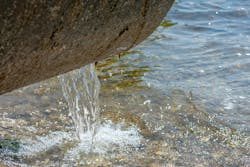Regulators reissue discharge permit for JCI/TYCO facility in Wisconsin
The Wisconsin Department of Natural Resources (DNR) recently announced the reissue of the Wisconsin Pollutant Discharge Elimination System (WPDES) permit that regulates industrial wastewater discharges from the Johnson Controls Inc. and Tyco Fire Products, LP Facility ("JCI/Tyco") to the Menominee River at One and Two Stanton Street in Marinette, Wisconsin.
The effective date of the permit will be Jan. 1, 2021. Discharges from the site include metal finishing wastewater, wastewater associated with the manufacturing of fire protection products and stormwater from roof drains.
Additionally, groundwater contaminated by manufacturing operations is contained beneath the site by a series of underground containment walls. To prevent migration of this contamination off-site, JCI/Tyco pumps contaminated groundwater from beneath the site to maintain groundwater levels and discharges this groundwater after treatment.
The reissued permit requires several actions by JCI/Tyco to minimize arsenic, mercury and specific per- and polyfluoroalkyl (PFAS) concentrations discharged into the Menominee River. With respect to arsenic and mercury the permit requires the following conditions of variances to water quality standards for those two pollutants:
- A reduction in arsenic mass discharge limits of greater than 98%
- Upgrade the existing groundwater treatment system to include the best available treatment technology for removal of arsenic and mercury, ensuring best possible quality of discharge
- Abandon an existing underground storm sewer system that is susceptible to infiltration of contaminated groundwater, thereby eliminating discharge of untreated groundwater
- Complete the diversion of treated process wastewater and treated groundwater to a single combined outfall
- Complete the diversion of boiler blowdown and non-contact cooling water to the City of Marinette sanitary sewer system
- Complete diversion of roof drain runoff to surface conveyance to eliminate potential for future infiltration of contaminated groundwater into underground sewers
In taking the actions above, the department authorizes JCI/Tyco to discharge treated groundwater from the site, thereby preventing the accumulation of contaminated groundwater within underground containment walls and, ultimately, preventing a release of contaminated groundwater to the Menominee River without treatment. To realize the best possible environmental outcome, the reissued permit requires the best available treatment to remove arsenic and mercury while recognizing that attainment of water quality standards for these pollutants is infeasible with available treatment.
In addition, JCI/Tyco has agreed to install treatment to remove certain PFAS to acceptable levels before discharge as a part of the upgrades to the existing groundwater treatment system located at the site. The reissued permit includes limits and monitoring for PFOS that protect Michigan's Water Quality Standard of 11 parts per trillion, given that the receiving water, the Menominee River, is an interstate water. The Wisconsin DNR is currently in the process of developing surface water standards for PFOA and PFOS, but those standards are not yet in effect.
